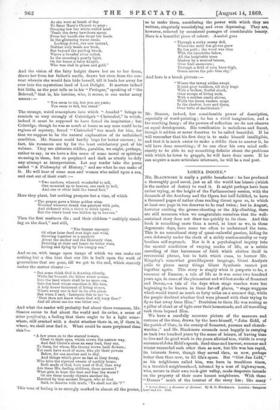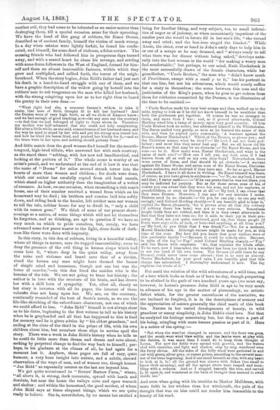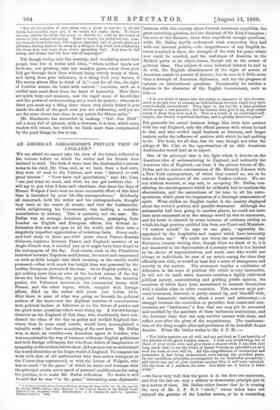LORNA DOONE.*
Mn. BLACEMORE is really a public benefactor : he has produced a thoroughly good novel, just as all the world has leisure (which is the mother of desire) to read it. It might perhaps have been rather trying, at the height of the Parliamentary session, with the demands of the Academy and the Opera but half fulfilled, to have a thousand pages of rather close reading thrust upon us, in which at least one page in ten deserves to be read twice ; but in August, however exciting the grouse-shooting or the Alp-climbing, there are still moments when we congratulate ourselves that the well- sustained story does not draw too quickly to its close. And this book is something more than a novel, at least as we, in these degenerate days, have come too often to understand the term. This is no sensational story of quasi-unlawful passion, hiding its own deformity under the cloak of a sickly sentimentality or very bootless self-reproach. Nor is it a psychological inquiry into the mental conditions of varying modes of life, or a subtle unveiling of that barrenness of faith which clothes itself in reverential phrase, but in both which cases, to borrow Mr. Kingsley's somewhat grandiloquent language, Giant Analysis pulls to pieces many things Giant Synthesis cannot put together again. This story is simply what it purports to be, a romance of Exmoor, a tale of life as it• was some two hundred years ago, in some of the pleasantest and wildest nooks of Somerset and Devon,—a tale of the days when stage coaches were but beginning to be known in those far-off places, " stage. waggons which would travel as much as forty miles on a summer day, while the people doubted whether God were pleased with their trying to fly so fast away from Him." Doubtless to them He was resting as a pillar of cloud or of light over their homesteads, and all travelling took them beyond Him.
We have a carefully accurate picture of the manners and customs of the time, drawn by the hero himself, " John Ridd, of the parish of Oare, in the county of Somerset, yeoman and church- warden ;" and Mr. Blackmore succeeds most happily in carrying us back two hundred years by the sense of leisure, of having time to live and do good work in the years allotted him, visible in every sentence of John Ridd's speech. Seed-time and harvest, summer and winter succeeded each other then as now, but life was less rapid, its interests fewer, though they served then, as now, perhaps better then than now, to fill life's space. But " Girt Jan Lidd," as his neighbours called him, was born in troublotts times, in a troubled neighbourhood, infested by a nest of highwaymen, who, secure in their own rock-girt valley, made desperate inroads on the property of their more honest neighbours. With these " Doones " much of the interest of the story lies ; like many • Lorna Doone: a Romance of Exmoor. By R. D. Slackmoro. London : Sampson Low and Co. MS.
another evil, they had come to be tolerated as an easier matter than destroying them, till a special occasion arose for their uprooting. We have the head of this gang of robbers, Sir Ensor Doone, described as of ancient family, himself the victim of much wrong. In a day when estates were lightly forfeit, he found his confis- cated, and himself, for some deed of violence, a felon outlaw. The seeming friends who had followed him in prosperous days turned away, and with a seared heart he chose his revenge, and settling with some dozen followers in the West of England, formed for him- self and them an almost inaccessible fastness, within which they grew and multiplied, and sallied forth, the terror of the neigh- bourhood. When the story begins, John Ridd's father had just met his death in a hand-to-hand struggle with one of them, and we have a graphic description of the widow going by herself into the robbers' nest to ask vengeance on the man who killed her husband, with the strong misgiving upon her as to her right thus to beard the gentry in their own dens :—
" What right had she, a common farmer's widow, to take it amiss that men of birth thought fit to kill her husband ? And the Doones were of very high birth, as all we clods of Exmoor knew ; and we had enough of good teaching now—let any man say the contrary —to feel that we had belonged of right to those above us. Therefore my mother was half-ashamed that she could not help complaining. But after a little while, as she said, remembrance of her husband came, and the way he used to stand by her side and put his strong arm round her, and how he liked his bacon fried, and praised her kindly for it,—and so the tears were in her eyes, and nothing should gainsay them."
And little match does the good woman find herself for the smooth- tongued, high-bred villain, who answered her with such courtesy, as she stood there "sobbing, with her new red handkerchief, and looking at the pattern of it." The whole scene is worthy of an artist's pencil, and we understand at the end of it how it was that the name of " Doone" for miles around struck terror into the hearts of more than women and children ; for deeds were done, which our author has carefully copied from old local annals, which stand on higher authority than the imagination of a writer of romance. As how, on one occasion, when ransacking a rich man's house, one of their number received a wound from which on his homeward way he died ; his brothers and cousins laid him softly down, and riding back to the hamlet, left neither man nor woman to tell the tale, neither house for any to dwell in, " only a child with its reason gone." We think of some of our present short- comings as a nation, of some things which will not let themselves be forgotten, and so thinking, are apt to question if we have so very much on which to pride ourselves, but, surely, we have advanced some few paces nearer to the light, since deeds of dark- ness like these were done with impunity.
In this story, in this den of robbers, living in a beautiful valley, where all things in nature, save its rugged inaccessibility, seem to deny the presence of the evil thing in human shape which had come into it, "where deep in the quiet valley, away from the noise and violence and brawl save that of a rivulet, stood the houses any man might have deemed the homes of simple mind and innocence, though not one but was the home of murder,"—in this den lived the maiden who is the heroine of the tale. We are not going to trace her history ; the author is in love with the creature of his brain, and has drawn her with a skill born of sympathy. Yet, after all, closely as her story is iuwoven with all its pages, the interest of these volumts does not hang upon her. We are, on the contrary, continually reminded of the best of Scott's novels, as we see the life-like sketching of the subordinate characters, not one of which we could afford to lose. " John Ridd" himself is not always clear as to his dates, beginning iu the first volume to tell us his history when he is greyheaded and all that has happened to him is food for memory and he is given advice by " his eldest grandson," and ending at the close of the third in the prime of life, with his own children about him, but somehow these slips in nowise spoil the story. There was a week in John Ridd's history when he tells us he could do little more than dream and dream and rove about, seeking by perpetual change to find the way back to himself ; per- haps, in his gladness at the climax of all, he had again for a moment lost it. Anyhow, these pages are full of racy, quiet humour, a very keen insight into nature, and a subtle, shrewd observation of the ways of men, and of women too, though honest "Jan Ridd" so repeatedly assures us the last are beyond him.
We get quite accustomed to " Rovers' Barrow Farm," where, " all above it, is strong, dark mountain, spread with heath and desolate, but near the house the valleys cove and open warmth and shelter ; and within the homestead, the good mother, of whom John Ridd says at times eloquent things, which we are quite ready to believe. She is, nevertheless, by no means too exalted a
being for familiar liking, and very subject, too, to small infirmi- ties of anger or of jealousy, as when momentarily impatient of the smaller part she would in future fill in her eon's life, "she turned away and cried ; and the box-iron singed the blanket." While Annie, the sister, ever at hand in John's early days to help him in or out of a scrape as he may demand, and " always ready to tell what there was for dinner without being asked," develops natu- rally into the best woman in the world " for making a weary man feel comfortable ;" but perhaps, to our mind, Ruth litickaback is the most successfully drawn of the female characters, while her grandfather, " Uncle Reuben," the man who " didn't know much of Providence, except with a small p to it," has his portrait in that one line, but not his adventures, which would nearly suffice for a story in themselves ; the scene between this man and the justiciaries of the King's peace, when he goes to get redress from them for robberies committed by the Doones, is too illustrative of the time to be omitted Uncle Reuben made his very best scrape and then walked up to the table, trying to look as if he did not know himself to be wealthier than both the gentlemen put together. Of course he was no stranger to them, any more than I was ; and, as it proved afterwards, Colonel Harding owed him a lump of money, upon very good security. Of him Uncle Reuben took no notice, but addressed himself to De Whiehehalee. The Baron smiled very gently, so soon as he learned tho cause of this visit, and then he replied quite reasonably, A warrant against the Dooms, Master Huckaback ? Which of the Dooms, so please you ; and the Christian names, what be they?'—' My lord, I am not their god- father ; and most like they never had any. But we all know old Sir Ensor's name, so that may be no obstacle.'—' Sir Ensor Doone, and his sons—so be it. How many sons, Master Huckaback, and what is the name of each one ?'—' How can I tell you, my lord, even if I had known them all as well as my own shop-boys ? Nevertheless, there wore seven of them, and that should be no obstacle.'—' A warrant against Sir Eager Dome, and seven sons of Sir Eager Doone, Christian names unknown, and doubted if they have any. So far so good, Master Huckaback. I have it all down in writing. Sir Ensor himself was there, of course, as you have given in evidencet---."—' No, no, my lord, I never said that ; I never said—.'—' If he can prove that he was not there, yon may be indicted for perjury. But as for those seven sons of his, of course you can swear that they wet° his sons, and not his nephews, or grandchildren, or even no Doones at My lord, I can swear that they were Doones. Moreover, I can pay for any mistake I make. Therein need be no obstacle:= Oh yes, he can pay ; he can pay well enough,' said Colonel Harding shortly.—' I am heartily glad to hear it,' replied tho Baron pleasantly, ' for it proves after all that this robbery (if robbery there has been) was not so very ruinous. Sometimes people think they are robbed, and then it is very sweet afterwards to find that they have not been so; for it adds to their joy in their pro- perty. Now, are you quite convinced, good sir, that these people (if there were any) stole, or took, or borrowed anything at all from you?' —‘ My lord, do you think that I was drunk ?'—' Not for a moment, Mister Huckaback. Although excuse might be made for you, at this time of the year. But how did you know that your visitors were of this particular family ?'—' Because it could be nobody else. Because, in spite of the fog'—' Fog !' cried Colonel Harding sharply.—' Fog said the Baron with emphasis. Ab, that explains the whole affair. To be sure, now I remember, the weather has been too thick for a man to see the head of his own horse. The Doones (if still there be any Doones) could never have come abroad ; that is as sure as simony. Master Huckaback, for your good sake, I am heartily glad that this charge has miscarried. I thoroughly understand it now. The fog explains the whole of it.'" But amid the relation of the wild adventures of a wild time, and of a love which looks as fresh as if born to-day, though purporting to be clothed in the garb of two hundred years ago (we must say, however, in Lorna's presence John Ridd is apt to be very much in advance of his age in the matter of phraseology, an artistic defect which, for the greater smoothness of the narrative, we are inclined to forgive), it is in the descriptions of scenery and the appreciation of nature generally- the chief merit of this book lies. Nature in her varied developments of beauty, in wild grandeur or sunny simplicity, is John Ridd's chief love. Not that he analyzed his feelings concerning her, but they were a part of his being, mingling with more human passion as part of it. Here is a notice of the spring :— "But when the weather changed in earnest, and the frost was gone, and the south-west wind blew softly, and the lambs were at play with the daisies, it was more than I could do to keep from thought of Lorna. For now the fields were spread with growth, and the waters clad with sunshine, and light and shadow, step by step, wandered over the furzy cloves. All the sides of the billy wood were gathered in and out with green, silver-grey, or russet points, according to the several man- ner of the trees beginning. And if one stood beneath an elm, with any heart to look at it, lo ! all the ground was strewn with flakes (too small to know their meaning), and all the sprays above were rasped and trem- bling with a redness. And so I stopped beneath the tree, and carved L. D. upon it, and wondered at the buds of thought that seemed to swell inside me."
And even when going with his troubles to Mother Melldrum, with more faith iu her wisdom than her witchcraft, the pain of the thought that was on hint could not render hint insensible to the beauty of his road.
" But all the middle of this valley was a place to rest in ; to sit and think that troubles were not, if we would not make them. To know the sea, outside the hills, but never to behold it ; only by the sound of waves to pity sailors labouring. Then to watch the sheltered Bun, com- ing warmly round the turn, like a guest expected, full of gentle glow and gladness, casting shadow far away as a thing to hug itself, and awakening life from dew, and hope from every spreading bud. And then to fall asleep, and dream that the fern was all asparagus."
Yet though loving only the country, and wondering much how people who live in towns and cities, "where neither lambs nor birds are, nor growing corn nor meadow grass,—how these poor folk get through their lives without being utterly weary of them, and dying from pure indolence, is a thing God only knows, if His mercy allows Him to think of it,"—yet for all this, the sight of London warms his heart with various " emotions, such as a cordial man must draw from the heart of humanity. Here there are quick ways and manners, and the rapid sense of knowledge and the power of understanding ere a word be spoken ; whereas at Oare you must say a thing three times very slowly before it gets inside the skull of the good man you are addressing, and yet we are far more clever here than in any parish for fifteen miles."
Mr. Blackmore has succeeded in making " Girt Jan Ridd " tell a story full of interest, with a slowness, it is true, which some readers will resent, but which we think more than compensated by the good things he has to say.
































 Previous page
Previous page